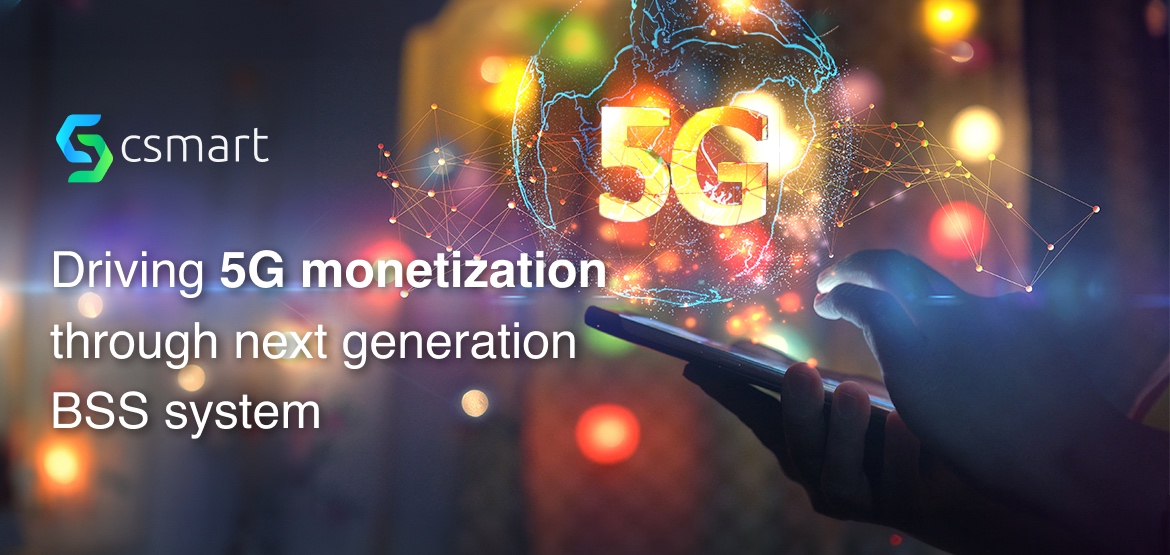- 5G
- Telecom
- BSS
- Network Slicing
- Monetization
Driving 5G monetization through next generation BSS system
29 March 2024 • 4 Mins Read

The BSS system in telecom handles key functionalities for a telecom operator like – creating products and bundles, managing leads, customer information, customer orders, provide customer support solutions, manage Inventory, and provide a dealer and partner management system, so BSS is a comprehensive solution which manage the complex Telecom operator business which is undergoing myriad of changes due to ever evolving telecom product and solutions. One such area is the advent of 5G technology and the impact it has on the telecom business, which will enable a telecom operator to drive future revenue from 5G use cases.
5G has a transformative potential for operators, which requires an effective monetization strategy and a robust 5G evolved Business Support System (BSS) to play a crucial role in unlocking 5G’s potential by creating tailored solutions for 5G and evolving technology to meet high demands.
Let us explore how telecom companies can leverage a powerful BSS to turn 5G use cases into a profitable reality.
Unravelling the Complexities of Case Management
Navigating through the maze of handling cases in telecom shows there are a lot of problems to deal with. From the multifaceted nature of customer inquiries and issues to the high volume of interactions across various channels, service providers face the daunting task of not only capturing and responding to each request but doing so in a manner that aligns with the customer’s expectations for immediacy and precision. This complexity is compounded by the need for seamless integration of backend systems and frontline customer service operations, ensuring that every interaction contributes positively to the customer's journey.
The Challenges of 5G Monetization
Complex service offerings
5G goes beyond traditional data and voice plans, encompassing diverse services like network slicing, IoT solutions, Enhanced mobile broadband (eMBB), mMTC (Massive Machine-Type Communications) , Ultra- Reliable Low Latency communication (uRLLC), cloud gaming, Augmented Reality (AR) and Virtual Reality (VR). A 5G evolved BSS is essential to manage these complex use cases.
Dynamic pricing and flexible billing models
5G demands real-time data usage monitoring and flexible billing models to cater to pay-per-use or dynamic pricing based on network slices or service tiers. As 5G networks become more complex and diverse, operators will require a sophisticated pricing models to optimize resource allocation and maximize revenue. By implementing transparent and fair dynamic pricing models, operators can unlock the full potential of 5G and create a win-win situation for both them and their customers.
Enhanced customer experiences
With proliferation of new services and offers associated to the same, a well-integrated BSS (CRM, Billing, Self-care, Mobile-app) along with social mediation integration is important to achieved targeted offers, rewards on loyalty and personalized offers to provide an enhanced customer experience.
Ecosystem Collaboration and Marketplace Integration
To unlock the full potential of 5G monetization, operators must collaborate across ecosystems and integrate with digital marketplaces. Strategic partnerships with content providers, device manufacturers, and industry stakeholders facilitate the creation of compelling bundled offerings and innovative service packages. This marketplace integration fosters synergy, driving adoption and revenue growth in the 5G landscape.
A modernized BSS System helps operators to monetize 5G effectively in following ways
Agile Product and service creation and Management
- A BSS system with a flexible product catalog enables rapid product creation and bundling of self and partner products to create and launch customized plans and reduce time to market.
- A microservices based architecture enables faster order fulfilment and service activation.
- 5G use cases requires applications which can create complex product and enable business teams to launch products with ease through their applications.
Create Partner Ecosystem and revenue share models
- 5G use cases thrives on partnership with external industries, which require BSS system to provide revenue share type of models and support operators by creating a partner ecosystem.
- BSS system should also facilitate partner onboarding and provide system to manage partner sales and discounts.
Real-time Charging, Rating and Billing
- The BSS should integrate with network elements to capture real-time usage data across various network slices and services.
- Advanced charging engines enable dynamic pricing based on usage, network conditions, or customer profile, maximizing revenue potential.
- Traditional charging models in telecom primarily focused on data usage (e.g., data volume or time spent connected) but in 5G world, network slicing creates a new charging landscape where network slices can be created, updated and deleted by allocating, configuring, adjusting or decommissioning network resources thus OCS in 5G world apart from usage charging, can also charge for slice creation, update and deletion of slices since resources are used to perform these functions in network slices.
- Converged billing platforms simplify the process for customers, handling different service charges through a single bill.
Data-Driven Customer Insights
- The BSS system provide analytics tool which provides customer insights from customer behaviour and usage of products and services.
- Modernized BSS systems provide the capabilities to integrate with other analytics tools to provide insights.
- These insights can be used to personalize marketing campaigns, recommend relevant services, enhance customer support for better customer satisfaction and optimize pricing strategies for individual customers.
Open APIs and Integration
- BSS systems are powered by open standard frameworks, Application Programming Interfaces (APIs) and interlinked components tailored to the demands of 5G.
- A modern BSS system should be able to integrate with external systems or even legacy system through open APIs.
- Open API’s fosters innovation and collaboration with third-party service providers, expanding the reach and value of 5G offerings and enhance the revenue by integrating the third part services.
Seamless Omnichannel Monetization:
- In the era of 5G, customers expect seamless experiences across multiple channels, including web, mobile, social media, and POS.
- A modernized BSS system not only facilitates seamless experiences but also enables operators to monetize these interactions effectively.
- By delivering consistent branding, pricing, and service experiences across all touchpoints, operators can maximize revenue potential while fostering customer loyalty and retention.
Factors which an operators should consider while upgrading their BSS solution
Upgrading and modernizing BSS systems is crucial for telecom companies to remain competitive in their respective market and to unlock the full potential of 5G, so look for BSS solutions that offer below technology advancement based on your current technology stack:
Microservices architecture
The BSS applications built on microservices based architecture consist of loosely coupled small services which operates together and improves applications flexibility, scalability and enable faster launch of services. These small services are event driven and enable real-time communication between services. These services can be added, removed, or modified without interrupting the application functionality.
The microservices architecture also supports open API's, which can be consumed and invoked by source and targeted systems, thus fostering seamless communication between applications.
Cloud-native architecture
Cloud native architecture reduces the operating expenditure and drives automation but requires technology and organizational changes to handle higher data volumes and dynamic service offerings.
Cloud native applications are quicker and easier to deploy, manage and automate traditional tasks, thus while moving towards a 5G network which involve higher data consumption and low latency for 5G use case, cloud native application is an important strategy for a telecom operator to monetize their 5G network.
AI and machine learning capabilities
The BSS system should empower real-time data analysis, personalized customer experiences, and predictive maintenance to drive higher customer satisfactions.
Security
While 5G utilizes stronger encryption algorithms, authentication, and authorization to make hacking and unauthorized access difficult, 5G has also introduced Subscriber Concealed Identity (SUCI), where your device doesn't transmit its real identity but a temporary, encrypted version, further protecting user privacy.
A telecom operator transformation journey to a Digital BSS system depends on many factors like operation needs, budgets, timelines and by embracing a futuristic BSS system. The telecom companies can transform 5G from a technological marvel to a sustainable revenue engine, which will unlock a world of possibilities and create use cases to foster the growth of an operator and enhance customer satisfaction.
Apart from having a robust BSS system which empowers Digital service providers (DSP) to provide 5G offerings to their customer, it is also essential for a DSP to have 5G monetization strategy, vision, innovative service offerings, and a collaborative approach to navigate the evolving 5G landscape.
Author

Nilesh Raghuvanshi,
Solution Engineer
Specializes in client solutioning and consulting within the telecom industry. With extensive experience, he offers valuable insights to enhance project outcomes